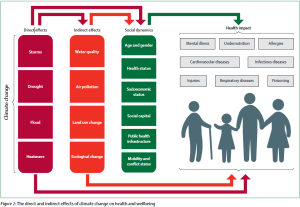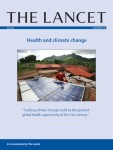A new report released by the Lancet Commission on Health and Climate Change has found that climate change poses such a threat to public health; it risks undoing the gains of the last 50 years.
This report, while important for mobilising an influential public health community, not only draws from the best peer-reviewed literature to understand climate change impacts, it focuses on the opportunities ahead. Ultimately, a healthy climate is linked to a healthy environment and fundamentally to healthy people.
More than 40 researchers from across Europe and China have spent more than a year compiling the Lancet Commission report, which builds on the previous work done in 2009. The 2015 edition has identified several significant opportunities to improve human health by tackling climate change. “Given the potential of climate change to reverse the health gains from economic development… tackling climate change could be the greatest global health opportunity of this century,” the report said.
Deliberately timed for this year, the report hopes to directly influence decision makers ahead of the United Nations climate change conference in Paris in December. Among its recommendations, it calls on governments to invest in climate change and public health research and monitoring and surveillance, and to scale-up financing for climate-resilient health systems worldwide. We know climate change increases the burden of many diseases for too many people, particularly those in the developing world. Heat stress, under-nutrition, diarrheal diseases like cholera, vector-borne diseases like malaria and dengue – each are changing in distribution and many are increasing as a result of climate change.
To help drive a transition to a low-carbon economy, over the next five years, the Commission recommends that governments:
- Invest in climate change and public health research, monitoring, and surveillance
- Scale-up financing for climate resilient health systems world-wide
- Protect cardiovascular and respiratory health by ensuring a rapid phase out of coal from the global energy mix
- Encourage a transition to cities that support and promote lifestyles that are healthy for the individual and for the planet
- Establish the framework for a strong, predictable, and international carbon pricing mechanism.
- Rapidly expand access to renewable energy in low-income and middle-income countries
- Support accurate quantification of the avoided burden of disease, reduced health-care costs, and enhanced economic productivity associated with a low-carbon economy
- Facilitate collaboration between Ministries of Health and other government departments, empowering health professionals and ensuring that health and climate considerations are thoroughly integrated in government-wide strategies
- Agree and implement an international agreement that supports countries in transitioning to a low-carbon economy
- To help drive this transition, the 2015 Lancet Commission will develop an independent Countdown to 2030: Global Health and Climate Action, designed to monitor progress on the implementation of climate change policies that promote health over the next 15 years
A more coordinated global community can help overcome these threats to both improve health and slow the pace of climate change. Many of the report recommendations align with that of other notable organisations, and include scaling up finance for climate resilience and expanding access to renewable energy.
